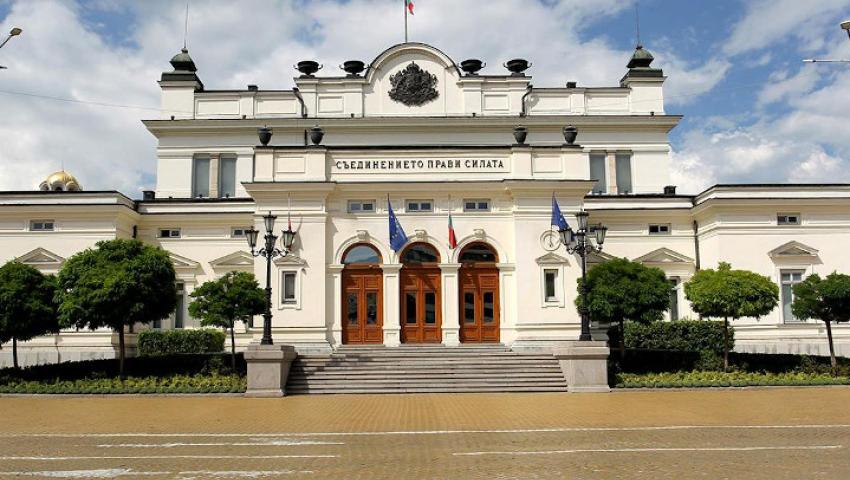GERB-SDS demanded in a statement that the President convene the CSNS because of the risk to energy security

The President of Bulgaria should convene the National Security Advisory Council, they demanded in a declaration read by MP Delyan Dobrev from the rostrum of the National Assembly. The reason is a threat to the country's national security, because of the recorded decarbonization goals on page 113 of the Recovery and Resilience Plan. In particular, it is about the closure of coal-fired power plants. According to the GERB-SDS calculation, this will lead to a contraction of the country's GDP by 4% in 2025.
"I suggest the president to urgently convene the National Security Advisory Council and I will explain why. In 2019, the condensing power plants, which are entirely coal-fired, produced 17 million 356 thousand 780 MWh of electricity. This can be verified from the official reports of the ESO" , said the deputy and chairman of the committee on energy at the National Assembly Delyan Dobrev.
"According to old article 113 of the National Plan for Recovery and Sustainability, I quote "the decarbonisation of the energy sector will focus on reducing carbon emissions from electricity production by 40%, taking the baseline levels of 2019.
The goal of reducing emissions must be achieved in 2025. I do the math - 17 million 356 thousand 780 MWh minus 40% makes 10 million 414 thousand 068 MWh or approximately 10.4 TWh. In this year, 13.11, when we have official data, in 317 days we produced 19 million 546 thousand 556 MWh from coal.
If we extrapolate the data for the entire year 2022, that is, we divide this number by 317 and multiply it by 365, we will get 22 million 506 thousand 287 MWh. Or roughly 22.5 TWh. That is, in order to fulfill the Recovery and Resilience Plan we need to reduce the actual electricity produced from coal from 22.5 TWh to 10.5 TWh. This is more than half or 53.78% or 12.1 TWh less electricity produced. 10.4 TWh is how much we will have left after we meet the commitment is 1190 MW of installed capacity at 100% load. And we have approximately 5,000 MWh of coal-fired power plants.
That is, we could say that we will close 76.2% of the coal plants in Bulgaria. I remind you that units 1 to 4 of the Kozloduy NPP, which we closed in order to enter the European Union, were 1760 MW. We will now close 3,810 MW, more than double the capacity. This is almost four reactors such as units 5 and 6 of the Kozloduy NPP.
Bulgaria's electricity export for this year is an all-time record - at the moment it is 10 million 895 thousand 288 MWh Again as of 13.11.2022. By extrapolating the data we get 12 million 545 thousand 147.7 MWh or approximately 12, 5 TWh for 2022. That is, exports in 2022 are almost as much as we need to reduce electricity production for 2025. Put another way, we can forget about electricity exports - one of the few value-added commodities, which we export.
Moreover, if we take into account the normal growth of electricity consumption in Bulgaria of about 3% per year, it turns out that by 2025 Bulgaria will become an importer of electricity. If there is any, since all our neighboring countries are experiencing chronic electricity shortages, it has been for decades.
The average price of electricity in Bulgaria as of today inclusive is 254.05 euros per MWh. This is the price at which we sold the energy for export. And if we multiply the exported energy in 2022 by the price, we get 3 billion 187 million 69 thousand 368 and 19 euros - almost 3.2 billion euros is the export of electricity for 2022. This is the amount that Bulgaria will lose per year of the missing export after the implementation of page 113 of the PVA.
By the same impressive amount, our trade balance will also deteriorate. Colleagues, I would like to point out that Bulgaria's exports for this year are expected to be 45 billion euros. If we lose 3.2 billion euros, that's more than 7% of Bulgaria's exports will disappear. That's not the worst. At 2022 GDP, cutting electricity production by €3.2 billion means our economy will shrink by almost 4%. GDP will shrink by almost 4%.
This is a recession comparable in scale to the COVID crisis or the global financial crisis of 2009.
I use this declaration to address the President of the Republic of Bulgaria: Dear Mr. President, energy security is part of national security, the commitments in the Recovery and Sustainability Plan threaten energy security and the country's economy.
Competent institutions to look for the culprits. We have a duty to seek solutions before it is too late. The convening of the CSNC cannot be postponed, concluded Dobrev.
